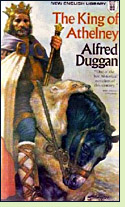The King of Athelney
also titled The Right Line of Cerdic
by Alfred Duggan
Reviewed by David Maclaine

The King of Athelney offers up the life of Alfred the Great, treating in a tidy 302 pages events spanning six volumes in Bernard Cornwell's Saxon Tales. Both Cornwell and Duggan base their portraits of the king on the dubious biography by "Bishop Asser" but Duggan tackles the absurdities and contradictions of that source with his characteristic skill and good humor, producing a more sympathetic picture of the king than Cornwell does. His version of Alfred the Great joins his series of astute portraits of likeable, well-intentioned people coping with the roles they must play. The great Alfred's life is dictated by his birth into a family that takes great pride in its antiquitity, going back to Woden in "the right line of Cerdic" - he sees the Carolingians as "a new family." When this younger son with no real notion of becoming king finds himself with the crown, he goes about his business as dutifully as any conscientious modern heir to a business. This means he must lead the thanes of Wessex against the depredations of what they call "the Army," the horde of Danes who have been ebbing and flowing across the landscape of northern Europe for decades. Alfred's kingdom survives when others fail because he keeps doing his job no matter how dire the situation, considering it disgraceful when kings flee into exile instead of fighting to the end as the position requires. Because his doggedness is mixed with real intelligence, he is eventually able to save his realm and create the foundations upon which the English nation was built.
Despite the tumultuous events raging in the background, The King of Athelney mostly tells this great story through the matter-of-fact thoughts and conversations of a man whose amusing foibles - bias against Mercians, an elevated sense of family pride and the amusing ability to rationalize his one failure to maintain his own ideals - combine with the self-assurance and devotion to duty of the prototypical Englishman. (1961, 302 pages)
More about The King of Athelney at Amazon.comThe King of Athelney appears on the list of The 45 Best Historical Novels Set in the Viking Age
Other novels about Alfred the Great:
The Last Kingdom by Bernard Cornwell (2004), about a high-born Saxon captured by Viking raiders as a child and brought up as a Viking who joins King Alfred in order to regain his inheritance; #1 in the Saxon series. See review or more info at Powell's Books
The Dragon and the Raven by G.A. Henty (1886), about a young Saxon thane who joins King Alfred's army. More info
The Edge of Light by Joan Wolf (1990), about Alfred the Great, his wife Elswyth, and the English resistance to the Danish invasion. More info
Nonfiction about Alfred the Great:
Alfred the Great: The Man who made England by Justin Pollard (2006). More info
Alfred the Great: War, Culture and Kingship in Anglo-Saxon England by Richard Abels (1998). More info
Alfred the Great: Asser's Life of King Alfred and Other Contemporary Sources translated by Simon Keynes and Michael Lapidge (Penguin edition 1983). More info
Online:
Alfred the Great at the official website of the British Monarchy
Back to Novels of Anglo-Saxon England
Back to Directory of Book Reviews